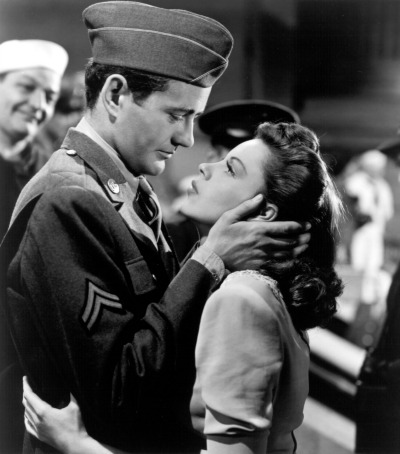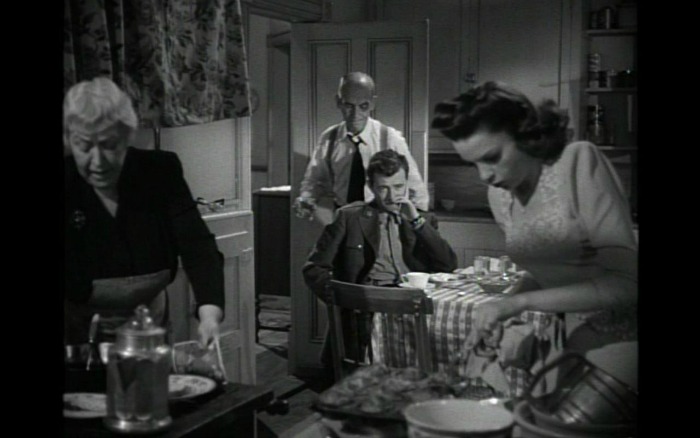Another hundred people just got off of the train
And came up through the ground,
While another hundred people just got off of the bus
And are looking around
– ‘Another Hundred People’, Company, Stephen Sondheim
The Clock is a New York story, even though the actors never set foot there. Practically everything, from Penn Station and the subway at Grand Central to the lobby at the Astor hotel, was recreated on MGM’s soundstages. Yet the city has rarely seemed more real on film: crowded, captivating, alive. There are people getting off trains and buses and planes, all bustling about, with millions of stories to tell. The Clock is about just two.
It’s wartime and Corporal Joe Allen (Robert Walker) arrives in New York City for two days’ leave before he ships off to Europe. A small-town boy adrift in Manhattan, he bumbles about Penn Station until he meets a young secretary, Alice Maybery (Judy Garland). She trips over his outstretched foot and loses a heel; he returns it and falls instantly in love. Joe talks Alice into showing him around town and the two spend the afternoon sightseeing, bonding over the seals at Central Park Zoo and Egyptian sculptures at the Met. Alice is charmed, but not enough to mind saying goodbye. Desperate not to lose her, Joe persuades her to have dinner with him, and over the next few hours, they realize they’d like to spend the rest of their lives together.
Joe and Alice’s whirlwind courtship—they fall in love over barely 24 hours—shouldn’t be plausible, but it is. The war gives it urgency. Like a latter-day Prince Charming clutching Cinderella’s slipper, Joe knows he’s found the right girl the moment he meets Alice, and he can’t bear to let her go because there’s a chance he might be wounded or killed without ever seeing her again. The threat of death and loss makes their relationship poignant, and Walker, Garland and director Vincente Minnelli communicate this perfectly.
Robert Walker made only 20 films before his untimely death at the age of 32 and played lots of servicemen—a bomber pilot in Thirty Seconds Over Tokyo, a soldier in See Here, Private Hargrove, a soldier again in Since You Went Away, opposite his then-wife, Jennifer Jones—but Joe Allen is the finest of his men in uniform. It’s the little things that make his performance feel so genuine—his wide-eyed delight at discovering escalators in Penn Station; the way his voice, slightly high-pitched, sounds close to cracking whenever he’s excited or in earnest. Walker has to assure audiences of Joe’s chivalry and sincerity, even as he pesters Alice with personal questions and keeps imposing on her kindness. Joe could have come across as creepy—in Walker’s hands, he’s a tenacious Labrador. As the night wears on, Walker seamlessly switches registers from boy next door to passionate lover, smouldering at Garland with the same intensity that would later send audiences scurrying from him in Strangers on a Train. But one of my favourite moments comes later, when Alice and Joe are about to have breakfast with friends, and he sits and watches with quiet pride as she bustles round the kitchen. It’s an important sign of Joe’s confidence in her and Walker plays it beautifully. Considering how brief his career was, it’s bittersweet to see him be this good onscreen.
The Clock was Judy Garland’s first straight dramatic film and she ought to have made more. As Alice, she is compassionate yet wary, generous but brittle. When Alice’s roommate chastises her for letting herself be picked up by “a stray soldier”, the doubt that crosses her face shows how vulnerable she is, but she keeps her date anyway. After the dinner goes sour, she snaps at Joe for not appreciating why she decided to go out with him (he’s a lonely soldier far from home), while briskly cleaning a stain off his jacket sleeve with her napkin—underneath the tough exterior, her heart is as tender as his. Garland was clearly a fine dramatic actress, yet sadly it would be 16 years before she appeared in a non-musical role again, in a brief scene in Judgment at Nuremberg.
Besides the central performances, what makes The Clock so special is Vincente Minnelli’s decision to treat New York City as the film’s third main character. Although the cast never left Culver City, Minnelli was a former New Yorker and built his sets to resemble the real locations as closely as possible, filling in the gaps with second unit footage shot in the Big Apple. (If the real Penn Station looked even a tenth as beautiful as it does in the film, I can’t understand why it was torn down in favour of the claustrophobic warren we have now.) Yet a city isn’t a collection of buildings so much as the people who live and work in them and Joe and Alice’s story throws up an eclectic, quintessentially New York bunch. In one of the film’s funniest scenes, Joe chases after the bus Alice has boarded and begs her to have dinner with him. She agrees and shouts back a time and meeting place, but he can’t hear her. Most of her fellow passengers are too busy laughing at the man puffing and panting outside their window to help, but an imperious grand dame takes pity on Joe. “Under the clock at the Astor at seven,” she tells him, in gloriously stentorian tones, before going back to her reading. Special mention must also go to James and Lucile Gleason as a cheery milkman and his wife, who unexpectedly give Joe and Alice some excellent relationship advice.
The Clock is a thoughtful, unassuming look at love during wartime that never feels forced or trite, anchored by excellent performances from Judy Garland and Robert Walker, and one of Hollywood’s best evocations of New York City. Watch it.


Leave a Reply